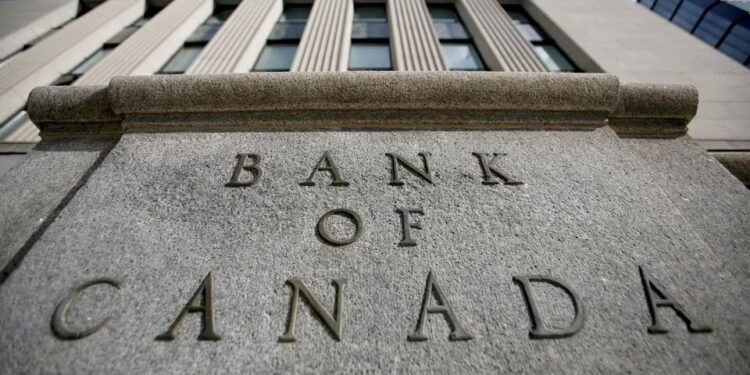The Bank of Canada will raise interest rates by a quarter-point for a second straight meeting to 5.00% on July 12 following a five-month pause earlier this year and then hold well into 2024, according to a majority of economists polled by Reuters.
While that is the new expected peak rate, this same group of economists had called 4.50% the top before the BoC’s surprise June move, underscoring how persistently price pressures have lingered in an economy still performing well.
Inflation slowed sharply to 3.4% in May from 4.4% the prior month, but is well above the central bank’s 2.0% target and not expected to reach it until early 2025.
So the BoC will press ahead and hike the overnight rate by 25 basis points to 5.00% on July 12, according to 20 of 24 economists in the June 28-July 6 Reuters poll.
That would amount to 475 basis points in total since March 2022, taking the overnight rate to a new 22-year high.
Economists appear more convinced of another rate rise than financial markets, which are pricing in a roughly 55% chance of a quarter-point hike this month.
“The slowdown (in inflation) may not be enough to remove another BoC rate hike from the table this month given stickier core rates of inflation, while a decent GDP report coupled with a tight job market suggests the economy remains sturdy,” said Priscilla Thiagamoorthy, senior economist at BMO Capital Markets.
Gross domestic product was expected to grow at an annualized pace of 1.3% this year, up from 0.7% in an April poll. The unemployment rate will average 5.4% in 2023, according to the median forecast, only marginally above the current 5.2%.
Inflation is not expected to fall to the central bank’s 2% target at least until 2025, according to the poll. Economists said core inflation, stripped of volatile food and energy prices, would fall only slightly by year-end.
“It is definitely true data has flagged higher and more persistent momentum in consumer spending as well as labour demand than we were previously expecting,” said Claire Fan, an economist at RBC Economics.
“The question is when are we going to be able to see a material slowdown in labour market conditions as well as (the) economic outlook. But in our heads, it is really a question of when, not so much whether it is going to happen.”
In the poll the probability of a recession happening or not over the coming year was a toss-up, with the chance of one occurring over the next two years at a median 60%.
The central bank was predicted to keep rates on hold at 5.00% until Q2 2024, said a majority of economists.
Rates staying high for longer is expected to boost the Canadian dollar, one of the best performers among G10 currencies this year. The loonie is forecast to gain 2.3% against the U.S. dollar to 1.30 over the coming year, a separate Reuters survey showed.
“The peak level of U.S.-Canadian relative rates is now probably in the rear-view mirror for the rest of the current economic cycle, and that should support the CAD from now on,” noted Kit Juckes, head of FX strategy at Societe Generale.
Source: Reuters


Recent Comments